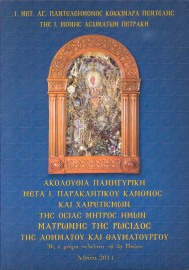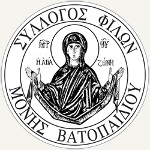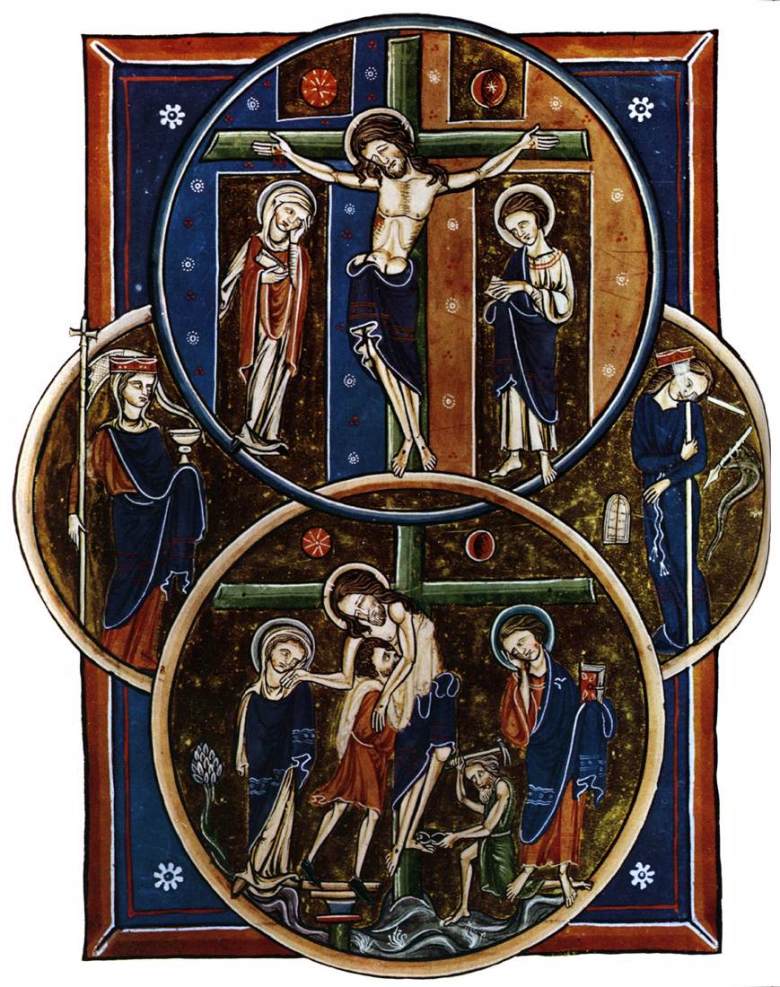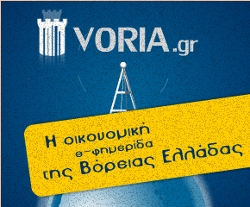In the following talk, Fr. Seraphim speaks to us from almost twenty years ago, and yet his words are quite relevant to our times as we approach the end of the second millennium. Although some of the individual examples he gives are now dated, there are now even more extreme examples of the same phenomena of which he speaks. As always, he humbles his understanding before the holy Scriptures and their interpretation by the Orthodox Holy Fathers, and thus his teaching about the times remains timeless, free of the intellectual fashions and prejudices of this world. As time goes on, the Orthodox world-view from which he received his wisdom will become ever more necessary for the spiritual survival of true Christians. Διαβάστε τη συνέχεια του άρθρου »

Το ιδιοκτησιακό καθεστώς της Λίμνης Βιστωνίδος.PDF

Επικοινωνία
-
Προστεθείτε στους 548 εγγεγραμμένους.
Στατιστικά:
- 13.657.646 επισκέψεις
Σύλλογος Φίλων Μονής Βατοπαιδίου
- Σύλλογος Φίλων Μονής Βατοπαιδίου (μονοτονικά)
- Σύλλογος Φίλων Μονής Βατοπαιδίου (πολυτονικά)
- Association of Vatopedi Friends
- Asociaţia Prietenii Mănăstirii Vatopedi
- Gesellschaft der Freunde des Klosters Vatopaidi
- Association des Amis du Monastère de Vatopaidi
- ОБЩЕСТВО ДРУЗЕЙ МОНАСТЫРЯ ВАТОПЕД
- ვატოპედის მონასტრის მეგობართა საზოგადოება
The smile from eternity
Αγιογραφείο – Icons
Ενημερωτικό φυλλάδιο
Ζωντανό Ραδιόφωνο και TV- Live Radio and TV
Κατηγορίες
Αρχείο
- Μαρτίου 2014 (3)
- Φεβρουαρίου 2014 (7)
- Ιανουαρίου 2014 (5)
- Δεκέμβριος 2013 (9)
- Νοέμβριος 2013 (4)
- Οκτώβριος 2013 (2)
- Σεπτεμβρίου 2013 (6)
- Αύγουστος 2013 (9)
- Ιουλίου 2013 (9)
- Ιουνίου 2013 (17)
- Μαΐου 2013 (704)
- Απρίλιος 2013 (884)
- Μαρτίου 2013 (723)
- Φεβρουαρίου 2013 (710)
- Ιανουαρίου 2013 (887)
- Δεκέμβριος 2012 (991)
- Νοέμβριος 2012 (806)
- Οκτώβριος 2012 (434)
- Σεπτεμβρίου 2012 (337)
- Αύγουστος 2012 (374)
- Ιουλίου 2012 (322)
- Ιουνίου 2012 (272)
- Μαΐου 2012 (307)
- Απρίλιος 2012 (290)
- Μαρτίου 2012 (303)
- Φεβρουαρίου 2012 (207)
- Ιανουαρίου 2012 (174)
- Δεκέμβριος 2011 (190)
- Νοέμβριος 2011 (311)
- Οκτώβριος 2011 (439)
- Σεπτεμβρίου 2011 (404)
- Αύγουστος 2011 (289)
- Ιουλίου 2011 (70)
- Ιουνίου 2011 (263)
- Μαΐου 2011 (356)
- Απρίλιος 2011 (336)
- Μαρτίου 2011 (340)
- Φεβρουαρίου 2011 (330)
- Ιανουαρίου 2011 (293)
- Δεκέμβριος 2010 (347)
- Νοέμβριος 2010 (366)
- Οκτώβριος 2010 (369)
- Σεπτεμβρίου 2010 (383)
- Αύγουστος 2010 (407)
- Ιουλίου 2010 (384)
- Ιουνίου 2010 (424)
- Μαΐου 2010 (465)
- Απρίλιος 2010 (495)
- Μαρτίου 2010 (642)
- Φεβρουαρίου 2010 (450)
- Ιανουαρίου 2010 (521)
- Δεκέμβριος 2009 (485)
- Νοέμβριος 2009 (411)
- Οκτώβριος 2009 (402)
- Σεπτεμβρίου 2009 (424)
- Αύγουστος 2009 (293)
- Ιουλίου 2009 (315)
- Ιουνίου 2009 (308)
- Μαΐου 2009 (246)
- Απρίλιος 2009 (158)
- Μαρτίου 2009 (215)
- Φεβρουαρίου 2009 (107)
- Ιανουαρίου 2009 (173)
- Δεκέμβριος 2008 (178)
- Νοέμβριος 2008 (131)
- Οκτώβριος 2008 (86)
1 Διαδικτυακή Πύλη «ΠΕΜΠΤΟΥΣΙΑ»
1.1 Αρκετά Χρήσιμα...
- Health Pages [Σελίδες Υγείας] (Ελλάδα)
- Γενική Γραμματεία Έρευνας & Τεχνολογίας
- Γενική Γραμματεία Αθλητισμού
- Δελτίο καιρού
- Εθνικό Τυπογραφείο (Ελλάδα)
- Εθνική Μετεωρολογική Υπηρεσία (Ελλάδα)
- Κέντρα Εξυπηρέτης Πολιτών (Ελλάδα)
- Κοινωνία της Πληροφορίας
- Μετεωρολογική Υπηρεσία (Κύπρος)
- Ο Καιρός (freemeteo)
- Ο Καιρός (Ελλάδα, Κύπρος, Εξωτερικό)
- Ο Καιρός (Καιρός)
- Ο Καιρός στην Ιερισσό Χαλκιδικής
- Ο Καιρός στην Κύπρο (freemeteo)
- Ο Καιρός στην Κύπρο (k24.net)
- Ο Καιρός στην Κύπρο (meteo2day)
- Ο Καιρός στην Ουρανούπολή Χαλκιδικής
- Ορθόδοξες Πνευματικές Ομιλίες
- Πρόγνωση καιρού
- k24 (Καιρός)
- Meteo
- Weather in Nicosia
- Weather.in.gr (Καιρός)
2 Αγιορείτικα...
- ! Τεχνική Υπηρεσία Ιεράς Κοινότητος Αγίου Όρους
- * Αγιορειτική Εστία
- * Αγιον Όρος (Πεμπτουσία)
- * Μετεωρολογικός Σταθμός Βατοπαιδίου
- * Μονή Βατοπαιδίου (Πεμπτουσία)
- * Ο Καιρός στη Μονή Βατοπαιδίου
- ** Ο Καιρός στις Καρυές
- 10η ΕΒΑ (Εφορεία Βυζαντινών Αρχαιοτήτω) Αγίου Όρους & Χαλκιδικής
- Agion Oros – Mount Athos
- Artion Magazine
- Athos Agion Oros
- πατήρ Μάξιμος Μόσχος (Αγιορείτης)
- Αγιορείτικες Μνήμες
- Αγιορείτικη Παράδοση
- Αγιορειτικό Βήμα
- Αγιορειτική Βιβλιοθήκη (Athos Library)
- Αγιορειτική Βοτανοθήκη (Athos Soundarchiveve)
- Αγιορειτική Ηχοθήκη (Athos Soundarchive)
- Αγιορειτική Κληρονομιά
- Αγιορειτική Μνήμη (Μονή Σίμωνος Πέτρας)
- Αγιορειτική Προσωπογραφία (Athos Prosopography)
- Αγιορειτική Πινακοθήκη (Athos Artarchive)
- Αγιορειτική Πινακοθήκη (Athos Artarchive)
- Αγιορειτική Ταινιοθήκη (Athos Moviearchive)
- Αγιορειτική Φωτοθήκη
- Αγιος ιωακείμ ο Iθακήσιος & Βατοπεδινός ο Παπουλάκης
- Γέρων Παΐσιος ο Αγιορείτης
- Ερασιτεχνικός Ιστοχώρος «Άγιον Όρος»
- ΙΜΜ Βατοπαιδίου – δικτ. τόπος
- Ιερόν Κελλίον Αγίων Αποστόλων-Αλυπίου
- ΚΕΔΑΚ (Κέντρο Διαφύλαξης Αγιορείτικης Κληρονομιάς)
- Καλύβη Αγίου Ιωάννου Θεολόγου, Νέα Σκήτη
- Καλύβη Κοιμήσεως, Σκ. Μικράς Αγίας Άννας
- Κελλί Αγίου Ευσταθίου, Μυλοπόταμος
- Μαναχός Λεόντιος Διονυσιάτης
- Μονή Εσφιγμένου (Επίσημο Ιστολόγιο)
- Μονή Εσφιγμένου (site)
- Μονή Ζωγράφου
- Μονή Καρακάλλου
- Μονή Παντοκράτορος Αγίου Όρους
- Μονή Χιλανδαρίου – Обнова Хиландара
- Μοναστηριακά
- Ο Καιρός στην Ιερισσό Χαλκιδικής
- Ο Καιρός στην Ουρανούπολή Χαλκιδικής
- Ορθόδοξος Μοναχισμός Νέα Σκήτη (Καλύβη Αγ. Σπυρίδωνος)
- Οσιος Μάξιμος ο Βατοπαιδινός
- Ομάδα Άγιον Όρος
- Ομιλος Φίλων Αγίου Όρους «Άγιος Αθανάσιος ο Αθωνίτης»
- Παγκύπριος Σύλλογος Ορθοδόξου Παραδόσεως "Οι Φίλοι του Αγίου Όρους"
- Σκήτη Αγίου Ανδρέα (Σεράϊ)
- Φίλοι Μονής Γρηγορίου
- Φίλοι Μονής Εσφιγμένου
- Weather.in.gr (Καιρός)
3.1 Μονές & Ησυχαστήρια
- – Άγια Μετέωρα –
- Greek Orthodox Books (e-Shop Χριστ. Ορθοδ. Φιλανθρωπικού Συλ. Φίλων Ι.Μ. Παντοκράτορος Μελισσοχωρίου «Άγιος Γρηγόριος ο Παλαμάς»)
- Γέροντας Νεκτάριος Μουλατσιώτης
- Ησυχαστήριο Παναγία των Βρυούλων
- Ησυχαστήριον Αγίας Τριάδος Λυθροδόντα
- Ι.Μ. Τιμίου Προδρόμου (Σκήτη Βεροίας)
- Ι.Μ. Τιμίου Προδρόμου Σερρών
- Καιρός Ι.Μ. Αγίας Τριάδος Χάλκης
- Μονή Ασωμάτων-Πετράκη
- Μονή Αγίας Αικατερίνης (Όρος Σινά)
- Μονή Αγίου Αυγουστίνου Τρικόρφου
- Μονή Αγίου Διονυσίου εν Ολύμπω
- Μονή Αγίου Ιωάννου Θεολόγου Πάτμου
- Μονή Αγίου Νεκταρίου, Τρίκορφο Λωκρίδος
- Μονή Αγίου Νεοφύτου
- Μονή Αγίου Παντελεήμονος Κοκκιναρά (Μετόχι Μονής Πετράκη)
- Μονή Αγίου Συμεών Νέου Θεολόγου, Κάλαμος
- Μονή Γενεθλίου της Θεοτόκου (Πελαγίας)
- Μονή Θεοτόκου Καλλίπετρας Βεροίας
- Μονή Κορώνης
- Μονή Κουδουμά
- Μονή Κοιμήσεως της Θεοτόκου Γηρομερίου
- Μονή Νέου Βάλαμο Φιλανδίας
- Μονή Οσίου Εφραίμ Σύρου, Κονταριώτισσα Πιερίας
- Μονή Προφήτη Ηλία Θήρας
- Μονή Παμμεγίστων Ταξιαρχών Νηλείας
- Μονή Παναγίας Χαματούρα
- Μονή Φανερωμένης Λευκάδος
- Περιοδικό Χριστιανική Σπίθα (Μονή Λογγοβάρδας, Πάρος)
- Lepavina Manastir
- Studenica Monastery
3.2 Μονές ΗΠΑ-Καναδά (προηγ. Εφραίμ Φιλοθείτου)
- Γέρων ΕΦΡΑΙΜ – Arizona USA
- Μονή Αγίων Αρχαγγέλων Kendalia
- Μονή Αγία Παρασκευής Washington
- Μονή Αγίας Σκέπης White Heaven
- Μονή Αγίου Αντωνίου Arizona
- Μονή Αγίου Κοσμά Αιτωλού Canada
- Μονή Αγίου Χρυσοστόμου Pl. Prairie
- Μονή Ευαγγελισμού Reddick
- Μονή Μεταμορφώσεως Harvard
- Μονή Προυσιώτισσας N. Carolina
- Μονή Παντοκράτορος Μελισ/ρίου
- Μονή Παναγίας Βλαχερνών Williston
- Μονή Τιμίου Προδρόμου Goldendale
3.3 Ναοί, Ενορίες, Προσκυνήματα & Ιερείς
- πρεσβύτερος Αντώνιος Χρήστου
- Αγία Ζώνη (Ναός Αγίας Ζώνης Κυψέλης)
- Αγιος ιωακείμ ο Iθακήσιος & Βατοπεδινός ο Παπουλάκης
- Ακολουθείν (π. Γεώργιος Δορμπαράκης)
- Βήματα (π. Θεμιστοκλής Μουρτζάνος)
- Ενορία Αγίων Πάντων Μακεδονίτισσα
- Ενορία Αγίου Νικολάου Σιάτιστας
- Ενοριακή Επιτροπή Νεότητος Ναού Αγίου Βασιλείου Πειραιώς
- Η Ορθοδοξία στην Άπω Ανατολή
- Η Ορθοδοξία στην Ινδονησία
- Ηλιαχτιδα (Ναός Αγίου Στυλιανού Γκύζη)
- Θησαυρός Γνώσεων και Ευσεβείας
- Ιερός Ναός Αγίου Αθανασίου Παλαιοκάστρου
- Κέντρο Προσφοράς και Αγάπης Άγιος Χριστόφορος (ΚΕΠΑ Άγιος Χριστόφορος, Παραλίμνι)
- Καθεδρικός Ναός Κοιμήσεως της Θεοτόκου Φανερωμένης Χολαργού
- Μητροπ. Ναός Αγίου Γεωργίου Παραλιμνίου
- Νέοι Ι.Ν. Ευαγγελισμού Θεοτόκου, Μαστιχάρι Κω
- Ναός Αποστόλου Ανδρέα Πλατύ Αγλαντζιάς
- Ναός Αποστόλου Φιλίππου Γραμματικούς Αιτωλοακαρνανίας
- Ναός Αποστόλου Φιλίππου Λατσιά
- Ναός Αγίων Θεοπατόρων Ιωακείμ & Άννης, Ανθόκηποι Ευκαρπίας
- Ναός Αγίων Κωνσταντίνου & Ελένης Ηλιουπόλεως
- Ναός Αγίων Κωνσταντίνου & Ελένης Καλοχωρίου-Παντειχίου
- Ναός Αγίων Τιμοθέου & Μαύρας Ηλιουπόλεως Αθηνών
- Ναός Αγίας Βαρβάρας Άνω Τούμπα Θεσσαλονίκης
- Ναός Αγίας Βαρβάρας Πατρών
- Ναός Αγίας Ειρήνης Χρυσοβαλάντου Νέας Ευκαρπίας
- Ναός Αγίας Μαρίνης Ηλιουπόλεως
- Ναός Αγίας Σοφίας Νέου Ψυχικού
- Ναός Αγίου Αρσενίου Καππαδόκη, Ίδρυμα Αροδαφνούσα
- Ναός Αγίου Γεωργίου Αράχωβας
- Ναός Αγίου Γεωργίου Ξυλπκάστρου
- Ναός Αγίου Γεωργίου Φραγκούδη, Άγιος Αθανάσιος – Λεμεσός
- Ναός Αγίου Δημητρίου Μπραχαμίου
- Ναός Αγίου Δημητρίου Πειραιώς
- Ναός Αγίου Δημητρίου Πολιούχου Θεσσαλονίκης
- Ναός Αγίου Θεοδώρου Τήρωνος
- Ναός Αγίου Ιωάννου Θεολόγου, Νέα Σεπόλια
- Ναός Αγίου Ιωάννου Προδρόμου, Πτολεμαΐδα
- Ναός Αγίου Κυριακού του Αναχωρητού Κίτι Λάρνακος
- Ναός Αγίου Λαζάρου, Λάρνακα
- Ναός Αγίου Λουκά Σταυρουπόλεως
- Ναός Αγίου Νικολάου του Νέου, Θήβα
- Ναός Αγίου Νικολάου Έγκωμης
- Ναός Αγίου Νικολάου Κάτω Πολεμιδιών
- Ναός Αγίου Νικολάου Πευκακίων
- Ναός Αγίου Νικολάου Πλωμαρίου
- Ναός Αγίου Παντελεήμονος Αμπελοκήπων Θεσσαλονίκης
- Ναός Αγίου Χρυσοστόμου Λακατάμιας
- Ναός Αγίου Χαραλάμπους Κρύα Ιτεών
- Ναός Εισοδίων Θεοτόκου Ημεροβιγλίου Θήρας
- Ναός Κοιμήσεως Θετόκου Παλαιού Φαλήρου
- Ναός Κοιμήσεως Θεοτόκου Ωραιοκάστρου
- Ναός Προφήτου ηλιού Πυλαίας Θεσσαλονίκης
- Ναός Παναγίας Φανερωμένης Ηρακλείτσης
- Ναός Παναγίας Χρυσοπολίτισσας Λάρνακας
- ΟΣΕΑ (Οργανισμός Συγκοινωνιών Επαρχίας Αμμοχώστου)
- Πρωτοκορυφαίοι (Κατηχητικές Συνάξεις Αυγόρου)
- Προσκυνητής
- Προσκύνημα Παναγίας Εκατονταπυλιανής Πάρου
- Πνευματικά Νοήματα (Οπτικοακουστικό υλικο)
3.4 Ορθόδοξες Χριστιανικές Αδελφότητες, Ενώσεις Επιστημόνων & Φοιτητών
3.5 Ορθόδοξος Ιεραποστολή
- Αποστολική Διακονία (Περιοδικό «Πάντα τα Έθνη»)
- Αρωμα Ασίας
- Αδελφότητα Ορθοδόξου Εξωτερικής Ιεραποστολής
- Γέφυρα Αγάπης (Σύλλογος Φίλων Ορθοδόξου Ιεραποστολής Πατριαρχείου Αλεξανδρείας)
- ΔΑΠΑΚ (Διακονία ΑΠοφυλακίσεως Απόρων Κρατουμένων) – Ορθόδοξος Ιεραποστολική Αδελφότης «Η Οσία Ξένη»
- Η Μαρτυρία του Χριστού στα σύγχρονα Έθνη
- Η Ορθοδοξία στο Κογκό
- Η λειψανοθήκη
- Ορθόδοξη Μοζαμβίκη
- Ορθόδοξος Λόγος
- Πανελλήνιος Χριστιανικός όμιλος Ορθοδόξου Ιεραποστολής
- Στον Ορθόδοξο Αμπελώνα της Αφρικής
- Συντονιστική Φοιτητική Ένωση Βορειοηπειρωτικού Αγώνα (Σ.Φ.Ε.Β.Α.)
- Σύλλογος Εθελοντικής Διακονίας Ασθενών Νοσηλευτικών Ιδρυμάτων (ΕΔΑΝΙ)
- Φως Χριστού, Ορθόδοξη Ιεραποστολική Αδελφότητα
- Orthodox Mission – Ορθόδοξη Ιεραποστολή
4.1 Πατριαρχεία & Αυτοκέφαλες Εκκλησίες
- 01 Οικουμενικόν Πατριαρχείον
- 01.01 Μητρόπολις Ιμβρου & Τενέδου
- 01.02 Αρχιεπισκοπή Κρήτης
- 01.04 Αρχιεπισκοπή Αμερικής
- 01.06 Αρχιεπισκοπή Θυατείρων
- 01.07 Εκκλησία Φιλλανδίας
- 01.08 Εκκλησία Εσθονίας
- 02 Πατριαρχείον Αλεξανδρείας
- 03 Πατριαρχείο Αντιοχείας
- 04 Πατριαρχείον Ιεροσολύμων
- 05 Πατριαρχείον Μόσχας
- 05 Τμήμα Εξωτερικών Εκκλησιαστικών Σχέσεων (ΤΕΕΣ) Πατριαρχείου Μόσχας
- 06 Πατριαρχείον Σερβίας
- 07 Πατριαρχείον Ρουμανίας
- 08 Πατριαρχείον Βουλγαρίας
- 09 Πατριαρχείον Γεωργίας
- 10 Εκκλησία της Κύπρου
- 11 Εκκλησία της Ελλάδος
- 11.1 Αρχιεπισκοπή Αθηνών
- 12 Εκκλησία της Πολωνίας
- 13 Εκκλησία της Αλβανίας
- Αρχιεπίσκοπος Χριστόδουλος
- Οικουμενικόν Πατριρχείον
4.2 Μητροπόλεις
- 01.01 Μητρόπολις Πριγκηπονήσων
- 01.03 Μητρόπολις Λέρου, Καλύμνου & Αστυπάλαιας
- 01.09 Μητρόπολις Νέας Ζηλανδίας
- 01.10 Μητρόπολις Βελγίου
- 01.10 Μητρόπολις Γαλλίας
- 01.10 Μητρόπολις Γερμανίας
- 01.10 Μητρόπολις Ελβετίας
- 01.10 Μητρόπολις Ιταλίας & Μελίτης
- 01.10 Μητρόπολις Μπουένος Άϊρες
- 02 Επισκοπή Κονγκό (Μπραζαβίλ) – Γκαμπόν
- 02 Επισκοπή Μπουρούντι & Ρουάντας
- 02 Μητρόπολις Ακκρας
- 02 Μητρόπολις Ειρηνουπόλεως & Σεϋχελλών Νήσων
- 02 Μητρόπολις Ζιμπάμπουε & Αγκόλας
- 02 Μητρόπολις Καμερούν
- 02 Μητρόπολις Νιγηρίας
- 06 Αρχιεπισκοπή Αχρίδος & Σκοπίων
- 10.1 Γραφείο Εκκλησίας της Κύπρου παρά τη Ευρωπαϊκή Ενώση
- 10.1 Επισκοπή Καρπασίας
- Blog Ιεράς Μητρόπολης Βεροίας
- συν-οδοιπορία (Μητρόπολις Πειραιώς)
- Αγία Σκέπη (Μητροπ. Λεμεσού)
- Επισκοπή Αρσινόης
- Επισκοπή Αμαθούντος
- Ιερά Μητρόπολις Ναυπάκτου & Αγίου Βλασιου (περιοδικό Εκκλησιαστική Παρέμβαση)
- Λεωφορεία Λάρνακος «Ζήνωνας»
- Μητρόπολις Αρτης
- Μητρόπολις Αργολίδος
- Μητρόπολις Αρκαλοχωρίου, Καστελλίου & Βιάννου
- Μητρόπολις Αιτωλίας & Ακαρνανίας
- Μητρόπολις Αλεξανδρουπόλεως, Τραϊανουπόλεως και Σαμοθράκης
- Μητρόπολις Βεροίας
- Μητρόπολις Βηρυττού
- Μητρόπολις Γόρτυνος και Μεγαλοπόλεως
- Μητρόπολις Γλυφάδος, Ελληνικού, Βούλας, Βουλιαγμένης & Βάρης
- Μητρόπολις Γορτύνης & Αρκαδίας
- Μητρόπολις Δρυϊνουπόλεως (Γραφείον Τύπου)
- Μητρόπολις Δρυϊνουπόλεως, Πωγωνιανής & Κονίτσης
- Μητρόπολις Δράμας
- Μητρόπολις Δημητριάδος & Αλμυρού
- Μητρόπολις Εδέσσης (Επίσημο Ιστολόγιο)
- Μητρόπολις Εδέσσης, Πέλλης & Αλμωπίας
- Μητρόπολις Ελευθερουπόλεως
- Μητρόπολις Ζακύνθου & Στροφάδων
- Μητρόπολις Ηλείας
- Μητρόπολις Θεσσαλιώτιδος καί Φαναριοφερσάλων
- Μητρόπολις Θεσσαλονίκης
- Μητρόπολις Ιερισσού, Αγίου Όρους & Αρδαμερίου
- Μητρόπολις Ιλίου, Αχαρνών & Πετρουπόλεως
- Μητρόπολις Κυδωνίας & Αποκορώνου
- Μητρόπολις Κυθήρων & Αντικυθήρων
- Μητρόπολις Κωνσταντίας-Αμμοχώστου
- Μητρόπολις Κύκκου & Τηλλυρίας
- Μητρόπολις Κίτρους, Κατερίνης & Πλαταμώνος
- Μητρόπολις Καστορίας
- Μητρόπολις Καισαριανής, Βύρωνος & Υμηττού
- Μητρόπολις Καλαβρύτων & Αιγιαλείας
- Μητρόπολις Κερκύρας, Παξών & Διαποντίων Νήσων
- Μητρόπολις Κηφισίας, Αμαρουσίου & Ωρωπού
- Μητρόπολις Κισάμου & Σελίνου
- Μητρόπολις Κιτίου
- Μητρόπολις Κορίνθου
- Μητρόπολις Κορίνθου, Σικυώνος, Ζεμενού, Ταρσού & Πολυφέγγους
- Μητρόπολις Κορίνθου, Σικυώνος, Ζεμενού, Ταρσού & Πολυφέγγους
- Μητρόπολις Λαρίσης & Τυρνάβου
- Μητρόπολις Λαγκαδά, Λητής & Ρεντίνης
- Μητρόπολις Λευκάδος & Ιθάκης
- Μητρόπολις Λεμεσού
- Μητρόπολις Λεμεσού (Ιστοχώρος Διανομής Ορθόδοξων Πνευματικών Ομιλιών)
- Μητρόπολις Μόρφου
- Μητρόπολις Μάνης
- Μητρόπολις Μεσσηνίας
- Μητρόπολις Μεσογαίας & Λαυρεωτικής
- Μητρόπολις Μονεμβασίας & Σπάρτης
- Μητρόπολις Νέας Σμύρνης
- Μητρόπολις Νεαπόλεως & Σταυρουπόλεως
- Μητρόπολις Ξάνθης & Περιθεωρίου
- Μητρόπολις Πάφου
- Μητρόπολις Παραμυθιάς, Φιλιατών, Γηρομερίου & Πάργας
- Μητρόπολις Παροναξίας
- Μητρόπολις Πατρών
- Μητρόπολις Περιστερίου
- Μητρόπολις Πολυανής & Κιλκισίου
- Μητρόπολις Ρόδου
- Μητρόπολις Ρεθύμνης & Αυλοποτάμου
- Μητρόπολις Σύρου, Τήνου, Άνδρου, Κέας & Μήλου
- Μητρόπολις Σύμης
- Μητρόπολις Σάμου, Ικαρίας & Κορσεών
- Μητρόπολις Σερρών & Νιγρίτης
- Μητρόπολις Τρίκκης & Σταγών
- Μητρόπολις Τριμυθούντος
- Μητρόπολις Ταμασού & Ορεινής
- Μητρόπολις Υδρας, Σπετσών, Αιγίνης, Ερμιονίδος & Τροιζηνίας
- Μητρόπολις Φθιώτιδος
- Μητρόπολις Φιλίππων, Νεαπόλεως & Θάσου
- Μητρόπολις Χαλκίδος, Ιστιαίας & Βορείων Σποράδων
- Συλλόγου Φίλων του Ρ/Σ Ι.Μ. Αργολίδας
- μητροπολις Κεφαλληνίας
5 Τέχνες, Πολιτισμός & Αθλητισμός
- * Εξερευνώντας τον κόσμο του Βυζαντίου
- 10η ΕΒΑ (Εφορεία Βυζαντινών Αρχαιοτήτω) Αγίου Όρους & Χαλκιδικής
- 3η Μπιενάλε Σύγχρονης Τέχνης Θεσσαλονίκης
- ANTart Live Μουσικό Θέατρο
- antart Productions creating culture
- Big Bang (short film)
- Cine gr
- CretEvents, η Πολιτιστική ατζέντα της Κρήτης
- Cyprus com
- Cyprus Events
- Eurovision
- Gallery Guide (Ελλάδα)
- Go2 ( Events στην Κύπρο )
- Green Theater (Κόρινθος)
- Αρχαιολογικό Μουσείο Θεσσαλονίκης
- Αρχαιολογικό Μουσείο Κύπρου
- Αττικό Πάρκο (Ζωολογικό)
- Γαλλικό Ινστιτούτο (Ελλάδα)
- Γαλλικό Ινστιτούτο (Θεσσαλονίκη)
- Γαλλικό Ινστιτούτο (Κύπρος)
- Γκαλερί Αργώ (Αθήνα)
- Γκαλερί Ζυγός (Αθήνα)
- Γκαλερί Ζήνα Αθανασιάδου (Θεσσαλονίκη)
- Γκαλερί Ζουμπουλάκη (Αθήνα)
- Γκαλερί ΝΕΚΤάΡΙΟΣ (Θεσσαλονίκη)
- Γκαλερί Ομικρον (Λευκωσία)
- Γκαλερί Σκουφά (Αθήνα)
- Γκαλερί Lefakis (Μάρης Λεφάκης)
- Γκαλερί Victor (Αθήνα)
- ΔΗΠΕΘΕ Αγρινίου
- ΔΗΠΕΘΕ Βορείου Αιγαίου
- ΔΗΠΕΘΕ Κρήτης
- ΔΗΠΕΘΕ Κέρκυρας
- ΔΗΠΕΘΕ Καβάλας
- ΔΗΠΕΘΕ Κομοτηνής
- ΔΗΠΕΘΕ Πάτρας
- ΔΗΠΕΘΕ Σερρών
- Δημοτικό Κέντρο Τεχνών Λευκωσίας
- Εταιρεία Κυπριακών Σπουδών
- Εταιρεία Μακεδονικών Σπουδών
- Ευρωπαϊκό Γραφείο Κύπρου (ΕΓΚ)
- ΕΘΑΛ (Εταιρεία Θεατρικής Ανάπτυξης Λεμεσού)
- ΕΛΙΑ Εκδοτική & Δημιουργική Εταιρεία
- Εθνικό Θέατρο (Ελλάδα)
- Εθνικό Μουσείο Σύγχρονης Τέχνης
- Εθνικόν Αρχαιολογικό Μουσείο (Ελλάδα)
- Εθνική Λυρική Σκηνή (Ελλάδα)
- Εθνική Πινακοθήκη
- Εικαστικό Πανόραμα στην Ελλάδα
- Θόλος, Θέατρο Εικονικής Πραγματικότητας
- ΘΟΚ (Θεατρικός Οργανισμός Κύπρου)
- Θέατρο (Κέντρο Πολιτισμού «Ελληνικός Κόσμος»)
- Θέατρο (Theater Info)
- Θέατρο Badminton
- Θέατρο Ριάλτο
- Θεσσαλικό Θέατρο
- Θεατρική Ομάδα Τρίπολης
- Ιδρυμα Άρτος
- Ιδρυμα Εικαστικών Τεχνών & Μουσικής Β. & Μ. Θεοχαράκη
- Ιδρυμα Μουσειου Μακεδονικού Αγώνα
- Ιδρυμα Mελετών Xερσονήσου του Aίμου (IMXA)
- Ινστιτούτο Θερβάντες
- Ινσντιτούτο Γκαίτε (Αθήνα)
- Ινσντιτούτο Γκαίτε (Θεσσαλονίκη)
- Ινσντιτούτο Γκαίτε (Κύπρος)
- Ινσντιτούτο Γκαίτε (Πάτρα)
- Ινσντιτούτο Γκαίτε (Χανιά)
- Κυπρίων Έργα
- Κυπριακή Βιβλιοθήκη – Ψηφιακές Εκδόσεις
- ΚΕΔΑΚ (Κέντρο Διαφύλαξης Αγιορείτικης Κληρονομιάς)
- ΚΘΒΕ (Κρατικό Θέατρο Βορείου Ελλάδος)
- Κατάλογος Θεατρικών Σκηνών
- Κινηματογράφος (cinemainfo)
- Κορινθιακό θέατρο Βασίλης Ρώτας
- Μέγαρο Μουσικής Αθηνών
- Μέγαρο Μουσικής Θεσσαλονίκης
- Μέγαρο Μουσικής Κομοτηνής
- Μακεδονικό Μουσείο Σύγχρονης Τέχνης
- Μουσείο Γουλανδρή Φυσικής Ιστορίας
- Μουσείο Ελληνικών Λαϊκών Οργάνων
- Μουσείο Μπενάκη
- Μουσείο Νάσιουτζικ
- Μουσείο Φωτογραφίας Θεσσαλονίκης
- Μουσείον Ιεράς Μονής Κύκκου
- Μουσική Βιβλιοθήκη της Ελλάδος
- Νicosia 24 ( your 24/7 on line quide )
- ΟΠΑΠ Α.Ε. (Οργανισμός Προγνωστικών Αγώνων Ποδοσφαίρου Α.Ε.)
- Ολυμπιακό Μουσείο Θεσσαλονίκης
- Παράκεντρο, Πολιτιστικός Οργανισμός
- Παγχαλκιδικός Σύλλογος Θεσσαλονίκης
- Παγκόσμιο Βήμα Θρησκειών & Πολιτισμών Ι.Μ. Κύκκου
- Περί Κύπρου
- Περιοδικό Κύτταρο Πολυγύρου
- Περιοδικό Πολύγυρος (Λαογραφικός Όμιλος Πολυγύρου)
- Πολεμικό Μουσείο
- Πολιτιστικό Ίδρυμα Τραπέζης Κύπρου
- Πολιτιστικός & Φυσιολατρικός Όμιλος Παλαιοχωρίου Χαλκιδικής «ΤΟ ΚΑΣΤΕΛΙ»
- Σπίτι της Κύπρου
- Σταυροδρόμι Πολιτισμών MKO
- Σατιρικό Θέατρο
- Υπουργείο Παιδείας & Πολιτισμού (Κύπρος)
- Υπουργείο Πολιτισμού & Τουρισμού (Ελλάδα)
- Υπουργείο Συγκοινωνιών & Έργων (Κύπρος)
- Φεστιβάλ Ελληνικών Ταινιών Μικρού Μήκους Δράμας
- Φεστιβάλ Εmotion Pictures – Ντοκιμαντέρ & Αναπηρία
- Φεστιβάλ Κινηματογράφου Θεσσαλονίκης
- Χρήστος Τσιαμούλης
- my Salonika
- Patras Events
- Patras Events
- PhotoBiennale
- Radio City Theater (Θεσσαλονίκη)
- Rodos Events
5.0 Αθλητισμός
5.1 Μουσεία
5.2 Γκαλερί
5.3 Θέατρα & Θεατρικά Σχήματα
5.4 Κινηματογραφικά...
5.5 Επιστήμες, Έρευνα & Τεχνολογία
- Αρχαιολογικό Μουσείο Θεσσαλονίκης
- Γενική Γραμματεία Έρευνας & Τεχνολογίας
- ΕΚΕΦΕ (Εθνικόν Κέντρων Έρευνας Φυσικών Επιστημών) Δημόκριτος
- ΕΦΕΤ (Ενιάιος Φορέας Ελέγχου Τροφίμων)
- Εθνικόν Αστεροσκοπείον Αθηνών
- Ιδρυμα Προώθησης Έρευνας (Κύπρος)
- Κυπριακό Κέντρο Περιβαλλοντικής Έρευνας & Εκπαίδευσης
- Κυπριακή Προεδρία Συμβουλίου ΕΕ 2012
- Κέντρο Βιοϊατρικής Ηθικής και Δεοντολογίας
- Μουσείο Γουλανδρή Φυσικής Ιστορίας
- Ο Ερευνητής
- Υπουργείο Ανάπτυξης, Ανταγωνιστικότητας & Ναυτιλίας
- Υπουργείο Εμπορίου, Βιομηχανίας & Τουρισμού
- Υπουργείο Συγκοινωνιών & Έργων (Κύπρος)
- Υπουργείο Υποδομών, Μεταφορών & Δικτύων (Ελλάδα)
- TEDxThessaloniki
5.7 Βιβλιο (Παρουσίαση-Κριτική)
5.8 Ιστορία-Λαογραφία
6 ΑΕΙ, ΤΕΙ, ΙΕΚ & Κολλέγια
- * Πίνακας Δημοσίων Ι.Ε.Κ.
- * Πίνακας Ιδιωτικών Ι.Ε.Κ.
- 1ο ΙΕΚ Θεσσαλονίκης
- 2ο ΙΕΚ Ηρακλείου
- 2ο ΙΕΚ Ηρακλείου
- 2ο ΙΕΚ Ηρακλείου
- Alexander College
- Americanos College
- CTL College
- Cyprus College
- Cyprus International Institude of Management
- Frederick University
- Intercollege
- Α.Τ.Ε.Ι. Θεσσαλονίκης
- Αρχή Ανάπτυξης Ανθρώπινου Δυναμικού
- Αριστοτέλειο Πανεπιστήμιο Θεσσαλονίκης
- Ακαδημία Αθηνών
- Ανωτάτη Εκκλησιαστική Ακαδημία Θεσσαλονίκης
- Ανώτερο Ξενοδοχειακό Ινστιτούτο Κύπρου
- Ανοικτό Πανεπιστήμιο Κύπρου
- Γεωπονικόν Πανεπιστήμιον Αθηνών
- Δασικό Κολλέγιο Κύπρου
- Δημοκρίτειο Πανεπιστήμιο Θράκης
- Διαπανεπιστημιακό Κέντρο Αναγνωρίσεως Τίτλων Σπουδών της Αλλοδαπής (ΔΙΚΑΤΣΑ)
- Επιτροπή Αξιολόγησης Ιδιωτικών Πανεπιστημίων (Κύπρος)
- Ευρωπαϊκό Πανεπιστήμιο Κύπρου
- Εθνικό Μετσόβιο Πολυτεχνείο
- Εθνικόν & Καποδιστριακόν Πανεπιστήμιον Αθηνών
- Εικονικό Μουσείο Κυπριακών Τροφίμων & Διατροφής
- Εκπαιδευτήρια Κωστέα–Γείτονα
- ΙΕΚ Αιγάλεω
- ΙΕΚ Ακμή
- ΙΕΚ Αλεξανδρούπολης
- ΙΕΚ Αμαρουσίου
- ΙΕΚ Βεροίας
- ΙΕΚ Γαλατσίου
- ΙΕΚ Δομή
- ΙΕΚ Επανωμής
- ΙΕΚ Θέρμης
- ΙΕΚ Καβάλας
- ΙΕΚ Καλαμάτα
- ΙΕΚ Κερατσίνιου
- ΙΕΚ Κορυδαλλού
- ΙΕΚ Κορέλκο
- ΙΕΚ Κομοτηνής
- ΙΕΚ Λάρισας
- ΙΕΚ Λαγκαδά
- ΙΕΚ Λαμίας
- ΙΕΚ Νέας Ιωνίας (Αθηνών)
- ΙΕΚ Νέας Ιωνίας (Αθηνών)
- ΙΕΚ Νέας Σμύρνης
- ΙΕΚ Νίκαιας
- ΙΕΚ Νεάπολης Θεσσαλονίκης
- ΙΕΚ Ξυνή
- ΙΕΚ Ξάνθης
- ΙΕΚ Πάτρας
- ΙΕΚ Παστέρ
- ΙΕΚ Ωμέγα
- ΙΕΚ Ωμέγα
- ΙΙΕΚ Δέλτα
- ΙΙΕΚ Praxis
- Ιδρυμα Ευγενίδου
- Ινστιτούτο Διαρκούς Εκπαίδευσης Ενηλίκων (ΙΔΕΚΕ)
- Κέντρο Παραγωγικότητας Κύπρου
- Κολλέγιο Ανατόλια
- Μεσογειακό Ινστιτούτο Διεύθυνσης
- Μητρόπολις Σερρών & Νιγρίτης (Ράδιο Κιβωτός)
- ΟΑΕΔ
- Οικονομικό Πανεπιστήμιο Αθηνών
- Πάντειο Πανεπιστήμιο Αθηνών
- Παιδαγωγικό Ινστιτούτο (Ελλάδος)
- Πανεπιστήμιο Αιγαίου
- Πανεπιστήμιο Δυτικής Μακεδονίας
- Πανεπιστήμιο Θεσσαλίας
- Πανεπιστήμιο Ιωαννίνων
- Πανεπιστήμιο Κρήτης
- Πανεπιστήμιο Κύπρου
- Πανεπιστήμιο Λευκωσίας
- Πανεπιστήμιο Μακεδονίας
- Πανεπιστήμιο Πατρών
- Πανεπιστήμιο Πειραιώς
- Τ.Ε.Ι Ηρακλείου
- Τ.Ε.Ι. Αθηνών
- Τ.Ε.Ι. Καβάλας
- Τ.Ε.Ι. Κοζάνης
- Τ.Ε.Ι. Λάρισας
- Τ.Ε.Ι. Λαμίας
- Τ.Ε.Ι. Μεσσολογγίου
- Τ.Ε.Ι. Πάτρας
- Τ.Ε.Ι. Πειραιά
- Τ.Ε.Ι. Σερρών
- Τ.Ε.Ι. Χανίων
- Τεχνολογικό Πανεπιστήμιο Κύπρου (ΤΕΠΑΚ)
- Υπουργείο Παιδείας & Πολιτισμού (Κύπρος)
- Υπουργείο Παιδείας, δια βίου Μάθησης και Θρησκευμάτων
- Χαροκόπειο Πανεπιστήμιο
- KES College
- Neapolis University Pafos
- P. A. College (Κύπρος)
- Philips College
- THe CTL Eurocollege (Κύπρος)
- The Cyprus Institute
- The Cyprus Institute of Marketing (CIM)
7.1 Δημόσιες Αρχές, Φορείς, Οργανισμοί & Υπηρεσίες
- Αρχή Ανάπτυξης Ανθρώπινου Δυναμικού
- Ανώτατο Δικαστήριο Κυπριακής Δημοκρατίας
- Γενικός Ελεγκτής Κυπριακής Δημοκρατίας
- Διαδικτυακή Πύλη Κυπριακής Δημοκρατίας
- Επίτροπος Διοικήσεως Κυπριακής Δημοκρατίας
- Επίτροπος Διοικήσεως Κυπριακής Δημοκρατίας
- Επίτροπος Προστασίας Δικαιωμάτων Παιδιού (Κυπριακής Δημοκρατίας)
- Ερευνητικό Κέντρο Ισότητας Φύλου (ΕΚΙΦ) Κυπριακής Δημοκρατίας
- Εθνική Πύλη Δημόσια Διοίκησης (Ελλάδα)
- ΚΕΠ (Κέντρα Εξυπηρέτησης του Πολίτη) (Ελλάδα)
- ΚΕΠ (Κέντρα Εξυπηρέτησης του Πολίτη) (Κύπρος)
- Κέντρο Ερευνών για Θέματα Ισότητας (ΚΕΦΙ) Ελληνικής Δημοκρατίας
- Νομική Υπηρεσία (γενική Εισαγγελία) Κυπριακής Δημοκρατίας
- Προεδρία Κυπριακής Δημοκρατίας
- Παρατηρητήριο Ισότητας Κύπρου (ΠΙΚ)
- Υπουργείο Ανάπτυξης, Ανταγωνιστικότητας & Ναυτιλίας
- Υπουργείο Εμπορίου, Βιομηχανίας & Τουρισμού
- Υπουργείο Παιδείας & Πολιτισμού (Κύπρος)
- Υπουργείο Παιδείας, δια βίου Μάθησης και Θρησκευμάτων
- Υπουργείο Πολιτισμού & Τουρισμού (Ελλάδα)
- Υπουργείο Συγκοινωνιών & Έργων (Κύπρος)
- Υπουργείο Υποδομών, Μεταφορών & Δικτύων (Ελλάδα)
7.2 Ιδρύματα & Οργανισμοί
- Helping.gr
- Ακαδημία Αθηνών
- Εταιρεία Μακεδονικών Σπουδών
- Ευρωπαϊκό Κοινοβούλιο
- Ευρωπαϊκή Επιτροπή
- ΕΡΤ (Ελληνική Ραδιοφωνία Τηλεόραση)
- Εθνικό Ίδρυμα Ερευνών
- Ηλεκτρονική εφημερίδα του Καταστήματος Κράτησης Γυναικών Ελεώνα Θήβας
- Θεραπευτικό Κέντρο Ηλιακτίδα Ζωής
- Ιδρυμα Ανδρέα Γ. Παπανδρέου
- Ιδρυμα Ευγενίδου
- Ιδρυμα Ευγενίδου
- Ιδρυμα Ιωάννου Φ. Κωστoπούλου
- Ιδρυμα Κωνσταντίνος Γ. Καραμανλής
- Ιδρυμα Λυσσαρίδη
- Ιδρυμα Λεβέντη
- Ιδρυμα Μείζωνος Ελληνισμού
- Ιδρυμα Μελίνα Μερκούρη
- Ιδρυμα Μιχάλης Κακογιάννης
- Ιδρυμα Ραδιομαραθώνιος
- Ιδρυμα Σταύρου Νιάρχου
- Ιδρυμα Χρίστου Στέλιου Ιωάννου
- Ιδρυμα Χριστίνα Α. Αποστόλου
- Ιδρυμα Ωνάση
- Ιδρυμα Mελετών Xερσονήσου του Aίμου (IMXA)
- Κέντρο Προσφοράς και Αγάπης Άγιος Χριστόφορος (ΚΕΠΑ Άγιος Χριστόφορος, Παραλίμνι)
- Κοινωφελές Ίδρυμα Λάτση
- Μονάδα Ανακουφιστικής Φροντίδας «Γαλιλαία»
- Οργανισμός Νεολαίας Κύπρου
- ΡΙΚ (Ραδιοφωνικό Ίδρυμα Κύπρου)
- Συμβούλιο της Ευρωπαϊκής Ένωσης
8 Βυζάντιο
9.1 MME, Ειδήσεις & Κοινωνικά Σχόλια
- BBC World Service
- Bogoslov
- Briefing News
- Cyprus Action Network of America (CANA)
- Deutsche Welle
- Αεροδρόμια Κύπρου (Λάρνακας & Πάφου)
- Αντίβαρο
- Ευρωπαϊκό κοινοβούλιο (Europarltv)
- Εάλω η Ελλάς ;;;
- Εκδόσεις «Αρχονταρίκι»
- Ελλάς Ορθοδοξία
- Ζωηφόρος
- Ζήνα Λυσάνδρου
- Κυπριακό Πρακτορείο Ειδήσεων (ΚΥΠΕ)
- ΚΤΕΛ Αχαΐας
- Λαυρεωτική εν δράσει
- Μουσείο Τυπογραφίας
- Νoctoc
- Ολυμπία
- Παρατηρητής
- Ρομφαία (Εκκλησιαστικό Πρακτορείο Ειδήσεων)
- Τα Χάλια (Μακεδονία)
- Το αυτονόητο
- Φίλοι Φυλακισμένων «Ο Ονήσιμος»
- Prince Oliver News
9.2 Συγκοινωνίες (Επίγειες, Θαλάσσιες & Ενααίριες)
- Aegean Airlines
- Cyprus Airways
- Cyprus by Bus
- http://Ολυμοιακή(OlympicAir)
- Inercity Buses (Υπεραστικά Λεωφορεία Κύπρου)
- Αστικό ΚΤΕΛ Κατερίνης
- Αστικό ΚΤΕΛ Πατρών
- Αττικό Μετρό
- Αερολέσχη Αγρινίου
- Αερολέσχη Θεσσαλονίκης
- Αερολέσχη Μυτιλήνης
- Αερολέσχη Μακεδονίας
- Αερολέσχη Πολυκάστρου
- Αερολέσχη Χανίων
- Ανεμολέσχη Αθηνών
- Δρομολόγια ΚΤΕΛ (για όλη την Ελλάδα)
- Διεθνές Αεροδρόμιο Ελευθέριος Βενιζέλος (Αθηνών)
- Διεθνές Αεροδρόμιο Μακεδονία (Θεσσαλονίκη)
- ΕΜΕΛ (Λεωφορεία Λεμεσού)
- Ελληνικά Περιφερειακά Αεροδρόμια
- Ζάππειον Μέγαρον
- ΗΣΑΠ (Ηλεκτρικοί Σιδηρόδρομοι Αθηνών-Πειραιώς)
- ΚΤΕΛ Αργολίδος
- ΚΤΕΛ Αττικής
- ΚΤΕΛ Αιτωλοακαρνανίας
- ΚΤΕΛ Ανδρου
- ΚΤΕΛ Δράμας
- ΚΤΕΛ Ευβοίας
- ΚΤΕΛ Ηρακλείου – Λασιθίου
- ΚΤΕΛ Ηλείας
- ΚΤΕΛ Θήρας
- ΚΤΕΛ Θεσσαλονίκης
- ΚΤΕΛ Κέρκυρας
- ΚΤΕΛ Καρδίτσας
- ΚΤΕΛ Καστοριάς
- ΚΤΕΛ Κεφαλονιάς
- ΚΤΕΛ Κορινθίας
- ΚΤΕΛ Κοζάνης
- ΚΤΕΛ Κομοτηνής
- ΚΤΕΛ Λέσβου
- ΚΤΕΛ Λακωνίας
- ΚΤΕΛ Μυκόνου
- ΚΤΕΛ Ν. Έβρου
- ΚΤΕΛ Ν. Ευρυτανίας
- ΚΤΕΛ Ν. Ημαθίας
- ΚΤΕΛ Ν. Λάρισας
- ΚΤΕΛ Ν. Πέλλας
- ΚΤΕΛ Ν. Φωκίδας
- ΚΤΕΛ Νάξου
- ΚΤΕΛ Ναομού Λευκάδας
- ΚΤΕΛ Νομού Ζακύνθου
- ΚΤΕΛ Πρέβεζας
- ΚΤΕΛ Ρόδου
- ΚΤΕΛ Σύρου
- ΚΤΕΛ Σαλαμίνας
- ΚΤΕΛ Τρικάλων
- ΚΤΕΛ Τήνου
- ΚΤΕΛ Υπεραστικών Γραμμών Ν. Μαγνησίας
- ΚΤΕΛ Φλώρινας
- ΚΤΕΛ Χαλκιδικής
- Κέντρο Αστικής Κινητικότητας Θεσσαλονίκης
- Λεωφορεία Πάφου
- Μετρό Θεσσαλονίκης
- Οργανισμός Λιμένος Ελευσίνος
- Οργανισμός Λιμένος Ηρακλείου
- ΟΑΣΑ (Οργανισμός Αστικών Συγκοινωνιών Αθηνών)
- ΟΑΣΘ (Οργανισμός Αστικών Συγκοινωνιών Θεσσαλονίκης)
- ΟΛΘ (Οργανισμός Λιμένος Θεσσαλονίκης)
- ΟΛΠ (Οργανισμός Λιμένος Πειραιώς)
- ΟΣΕ (Οργανισμός Σιδηροδρόμων Ελλάδος)
- Σταθμός Μακεδονία Υπεραστικών Λεωφορείων ΚΤΕΛ
- ΣΤΑ.ΣΥ. Α.Ε. [ Σταθερές Συγκοινωνίες ], (Αττικό Μετρό & ΗΣΑΠ & ΤΡΑΜ)
- ΤΡΑΜ ΑΕ
- Υπεραστικό ΚΤΕΛ Άρτας
- Υπεραστικό ΚΤΕΛ Ν. Μεσσηνίας
- Υπεραστικό ΚΤΕΛ Ν. Ξάνθης
- Υπεραστικό ΚΤΕΛ Πιερίας
- Υπεραστικό ΚΤΕΛ Φθιώτιδος
- Kapnos Airports Shuttle
- Limassol Airports Express
- Trainose (Υπεραστικά Τραίνα)
9.8 Blog Roll
- Analogion (Αναλόγιον)
- Helexpo
- History of Macedonia
- το σπιτόσκυλο
- Απαντα Ορθοδοξίας
- Ας μιλήσουμε επιτέλους
- Αηδόνι
- Ακτίνες
- Αμεση Βοήθεια
- Αντιαιρετικό Εγκόλπιο
- Βιβλία "Η ΜΕΛΕΤΗ"
- Γέροντες εποχής μας
- Εάλω η Ελλάς ;;;
- Εκδόσεις «Το Περιβόλι της Παναγίας»
- Η Άλλη Όψις
- Η Ρόδος – Rhodes
- Θεομητορικό (Η Πάντων Άνασσα)
- Θησαυρός Γνώσεων και Ευσεβείας
- ΙΚΟΝΙΑ ΕΠΕ
- ΙΧΘΥΣ [Ιησούς Χριστός, Θεού Υιός, Σωτήρ] (Ορθόδοξη Βιβλιοθήκη)
- Κυριακή – Ομιλίες Επισκόπου Αυγουστίνου Καντιώτη
- Κύριος Ιησούς Χριστός – Lord Jesus Christ
- Κέντρο Πατερικών Εκδόσεων
- Λάζαρος (μην κρίνετε δια να μην κριθείτε)
- Μήνυμα Ζωής
- Ορθόδοξη Ομάδα Δογματικής Έρευνας
- Ορθόδοξος Ιεραποστολικός Σύλλογος «Πορεία Αγάπης»
- Ορθόδοξος Κόσμος
- Οδεύοντας…
- Ομολογία Πίστεως
- Ομολογία Πίστης
- Πατερικός Λόγος
- Πατερικός Παράδεισος
- Πατερική Θεολόγία
- Παγκύπρια Ένωση Γονέων (PPU)
- Παιδικό Ιστολόγιο (αφιερωμένο στα Παιδιά)
- Πανελλήνια Ένωση Γονέων (Nick Marvel)
- Πνευματικά Θησαυρίσματα
- Πολέμαρχος
- Πολιτιστικός Θησαυρός της Ελληνικής Γλώσσας
- Σημαντικοί Έλληνες
- Τάλαντο
- Το Ζωντανό Ιστολόγιο
- Το κάλλος θα σώσει τον κόσμο (ΡΑΔΙΟ ΦΛΟΓΑ)
- Φως Χριστού (Ιεραποστολική Αδελφ.)
- Φωνή Βοώντος Αμαρτωλού Ιερέως
- Ψηφίδες
- Saint.gr
9.9 International Partners
- Again & again
- Bogoslov
- Cyprus Action Network of America (CANA)
- Diaspora Grecque
- Dăruind vei dobândi
- Edition Hagia Sophia
- Edition Hagia Sophia Blog
- Hellenic League of America (HLA)
- Lepavina Manastir
- Orthodox Encyclopedia (Deutch)
- Orthodoxe Literatur in deutscher Sprache
- Orthodoxes forum (auf Deutsch)
- Orthodoxie in Deutschland
- Presa Ortodoxă
- St. Andreas Bote (auf Deutsch)
- The fall of Byzantine Empire
Why study the signs of the times? (Fr. Seraphim Rose) Part 1
24 Νοεμβρίου, 2010 — vatopaidifriend3Christ addresses Himself to each person
22 Νοεμβρίου, 2010 — vatopaidifriend3Fr. Alexander Schmemann, Celebration of Faith (Sermons, Vol. 1: «I Believe»), pp. 15-17
Several years ago a French publishing house asked a cross-section of famous people –writers, philosophers, artists– to contribute to a small book, entitled What I Believe. … Their responses were profoundly different from one another, and each essay is fascinating to read. One and the same faith has become new and personal when mediated by personal experience, personal understanding, yet it never ceases to be one faith shared in common.
[P]eople today often speak about religion and Christianity primarily on an impersonal, objective, dogmatic level. Not only religion’s opponents, but even believers are accustomed to discussing how and what Christianity teaches, how and what believers affirm. Yet faith, in its very nature and essence, is something deeply personal, and therefore it is only really alive when seen in the context of personality and personal experience.Only when a particular teaching of the Church –or, as we say, a dogma, an affirmation of some particular truth– becomes my faith and my experience, and therefore the main content of my life, does this faith come alive. If one reflects on faith and thinks about how it passes from one person to another, it becomes obvious that what really convinces, inspires and converts is personal experience. Διαβάστε τη συνέχεια του άρθρου »
Α Sermon for Thomas Sunday (John 20:19-31)
10 Απριλίου, 2010 — vatopaidifriend3Dearly Beloved Brethren,
Nοbody knows the time or even the place that our Lord is coming again to judge the living and the dead. For this reason, the Fathers of our Church do not tell us to try and outsmart God, by predicting the time that He will appear. On the contrary the Fathers concentrate on teaching us to be constantly ready and watchful, by praying, fasting and doing works of love and faith. We are instructed to expect a sudden if not instant entry of our Lord.
In the final chapter of the Book of Revelations, the Apocalypse of Saint John we are informed that we must fully accept the imminent coming of our Lord Jesus Christ. Furthermore we are told that our world will suffer terribly before the DEUTERA PAROUSIA (SECOND COMING) of our Lord and that this world will be destroyed. Nevertheless so let it be, in obedience we should pray «Even so come, Lord Jesus [Christ]» (Rev 22:20) and come quickly. Διαβάστε τη συνέχεια του άρθρου »
The feast of the Annunciation of our Blessed Virgin Mary (March 25)
25 Μαρτίου, 2010 — vatopaidifriend3The feast of the Annunciation of the Virgin Mary is a feast of the Lord and of the Mother of God (Theotokos). It is a feast of the Lord because Christ who was conceived in the womb of the Theotokos. It is a feast of the Theotokos because it refers to the person who aided in the conception and Incarnation of the Word of God, that is, the All Holy Virgin Mary.
Mary (the Theotokos) has great value and an important position in the Church, precisely because she was the person whom all generations awaited, and she gave human nature to the Word of God. Thus the person of the Theotokos is associated closely with the Person of Christ. Furthermore, the value of the Virgin Mary is not only due to her virtues, but also mainly to the fruit of her womb. For this reason, Theotokology is very closely associated with Christology. When we speak of Christ we cannot ignore her who gave Him flesh. And when we speak of the Virgin Mary, we simultaneously refer to Christ, because from Him she draws Grace and value. This shows clearly in the service of the Salutations, in which the Theotokos is hymned, but always in combination with the fact that she is the mother of Christ: «Rejoice, for you are the throne of the king. Rejoice for you bear Him Who bears all things». Διαβάστε τη συνέχεια του άρθρου »
Mid-Lent: The Worship of the Cross… A Weapon of Victory!!
7 Μαρτίου, 2010 — vatopaidifriend3Archbishop Dimitri of Dallas and the South
«And he said unto them: Whosoever will come after me, let him deny himself, and take up his cross, and follow me. For whosoever will save his life shall lose it; but whosoever shall lose his life for my sake and the gospel’s the same shall save it. For what shall it profit a man, if he shall gain the whole world, and lose his own soul? Or what shall a man give in exchange for his own soul? Whosoever therefore shall be ashamed of me and of my words in this adulterous and sinful generation, of him also shall the Son of man be ashamed, when he cometh in the glory of his Father with the holy angels.» (Mark 8:34-38. From the reading for the Sunday of the Cross.)
This, the Third Sunday of the Fast is dedicated every year to the Adoration of the Holy Cross. As the Cross is at the center of our Faith, it seemed natural to the Church over the course of history, to place this «weapon of victory» in the midst of the assembly mid-way through the most spiritually intense season of the year. Gazing and meditating upon it, the faithful, who have chosen the way of the Cross as the way that leads to life, are renewed and strengthened for what remains of their Lenten pilgrimage to Pascha. Διαβάστε τη συνέχεια του άρθρου »
The True Faith in Christ
15 Φεβρουαρίου, 2010 — vatopaidifriend3If someone should say that true faith is the correct holding and confession of correct dogmas, he would be telling the truth, for a believer absolutely needs the Orthodox holding and confession of dogmas. But this knowledge and confession by itself does not make a man a faithful and true Christian. The keeping and confession of Orthodox dogmas is always to be found in true faith in Christ. The knowledge of correct dogmas is in the mind, and it is often fruitless, arrogant, and proud… The true faith in Christ is in the heart, Διαβάστε τη συνέχεια του άρθρου »
Βατοπαίδι: Μύθοι και Αλήθειες

Άγιον Όρος – Το ζωντανό Βυζάντιο (Mount Athos – The living Byzantium)
-
Πρόσφατα άρθρα
- Ο Άγιος Νικόλαος του Πσκώβ
- Bayram Hazırlığı
- AF PAZARI
- YARGI GÜNÜ PAZARI
- Kaybolan (Yirik) OĞLAN Haftasi
- Περί Αγίου Βαλεντίνου ο λόγος
- Ferisi ve vergi görevlisi
- Ο Γέρο Υπάτιος ο Γρηγοριάτης
- Ο βατοπαιδινός Άγιος Ιγνάτιος Μαριουπόλεως – ένας μικρός Μωυσής (με φωτογραφικό υλικό)
- Άγιος Ρωμανός, ο πρίγκηπας (+ 3 Φεβρουαρίου)
- AZİZ ΕFTIMIOS
- AZİZ ATHANASİOS’UN HAYAT HİKAYESİ
- Ο Άγιος ιερομάρτυς Νικόδημος του Μπέλγκοροντ [άφθαρτο λείψανο] (+ 10 Ιανουαρίου 1919)
- Yahya (Yuhanna) peygamber
- Saint Nikephoros the leper
Δημοφιλή άρθρα
- Μνήμη Οσίου Ιουστίνου Πόποβιτς
- Η Εκκλησία μια διαρκής Πεντηκοστή (Αγίου Ιουστίνου Πόποβιτς)
- Θαύμα στην Ιερά Μονή του Αγίου Εφραίμ στη Νέα Μάκρη
- Η Ορθόδοξη ανθρωπολογία και η ανθρωπολογία της επιστήμης
- Απολυτίκιον Αγίου Γεωργίου Καρσλίδη
- Ο Άγιος Κωνσταντίνος ο εξ Αγαρηνών (+1819) - 2 Ιουνίου
- Επικήδειος στον Αντώνη Γεωργιάδη, αγωνιστή της ΕΟΚΑ, υπασπιστή του Διγενή
- A Brief Explanation of the Symbolism of the Analabos
- YARGI GÜNÜ PAZARI
- Бодбийский Монастырь
Ο Καιρός
Το ημερολόγιο:
Ιουνίου 2024 Δ Τ Τ Π Π Σ Κ 1 2 3 4 5 6 7 8 9 10 11 12 13 14 15 16 17 18 19 20 21 22 23 24 25 26 27 28 29 30  ΣΥΝΑΞΑΡΙ
ΣΥΝΑΞΑΡΙΒίοι Αγίων και Γερόντων
Μεταστοιχεία
Ασυρματιστές του Θεού – O Γέρoντας Ιωσήφ ο Ησυχαστής
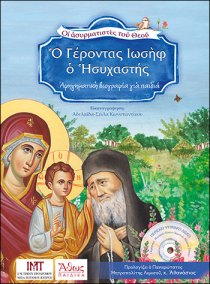
Αγία Ματρώνα η Τυφλή (Γέροντα Ονούφριου)
